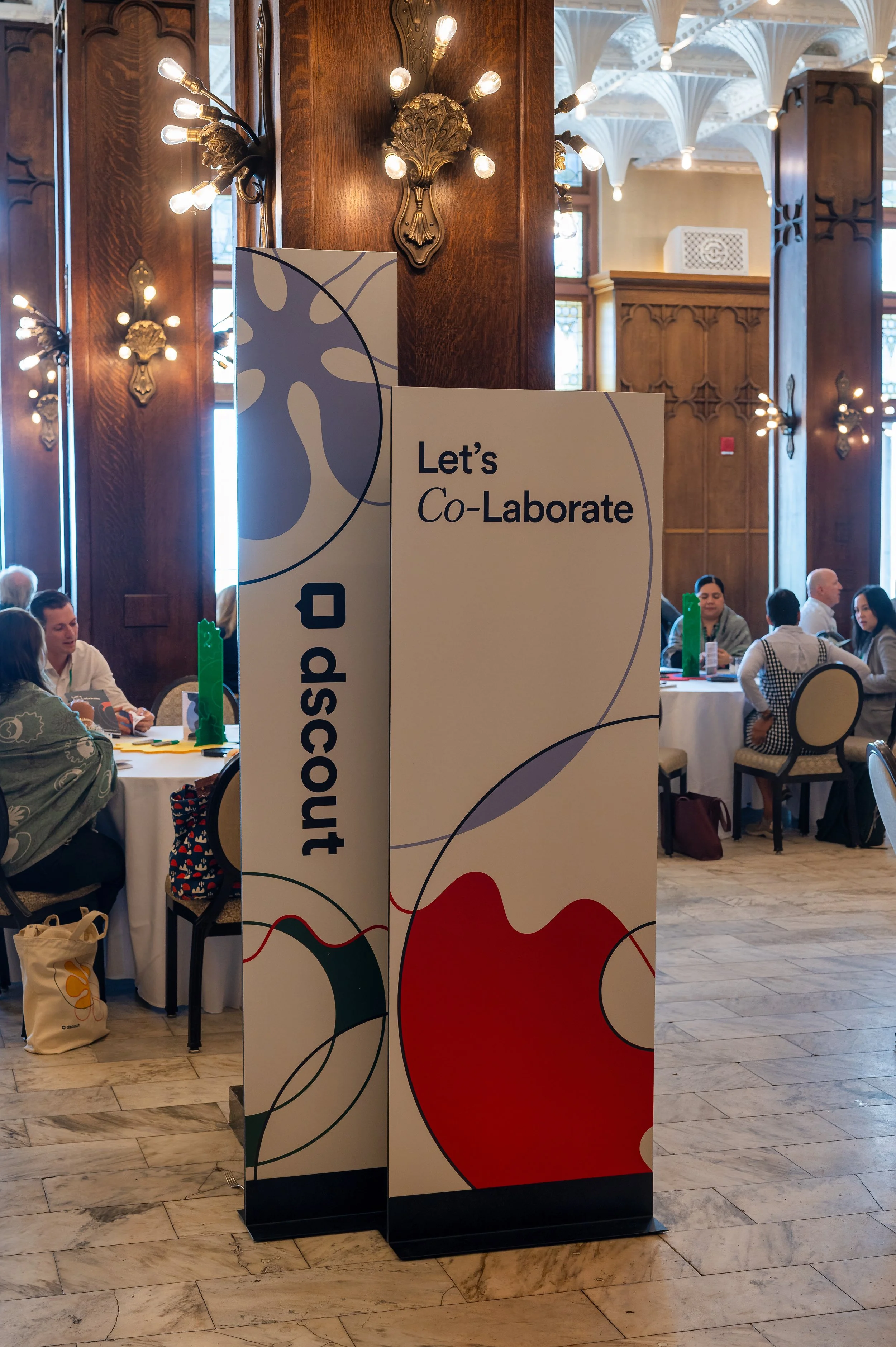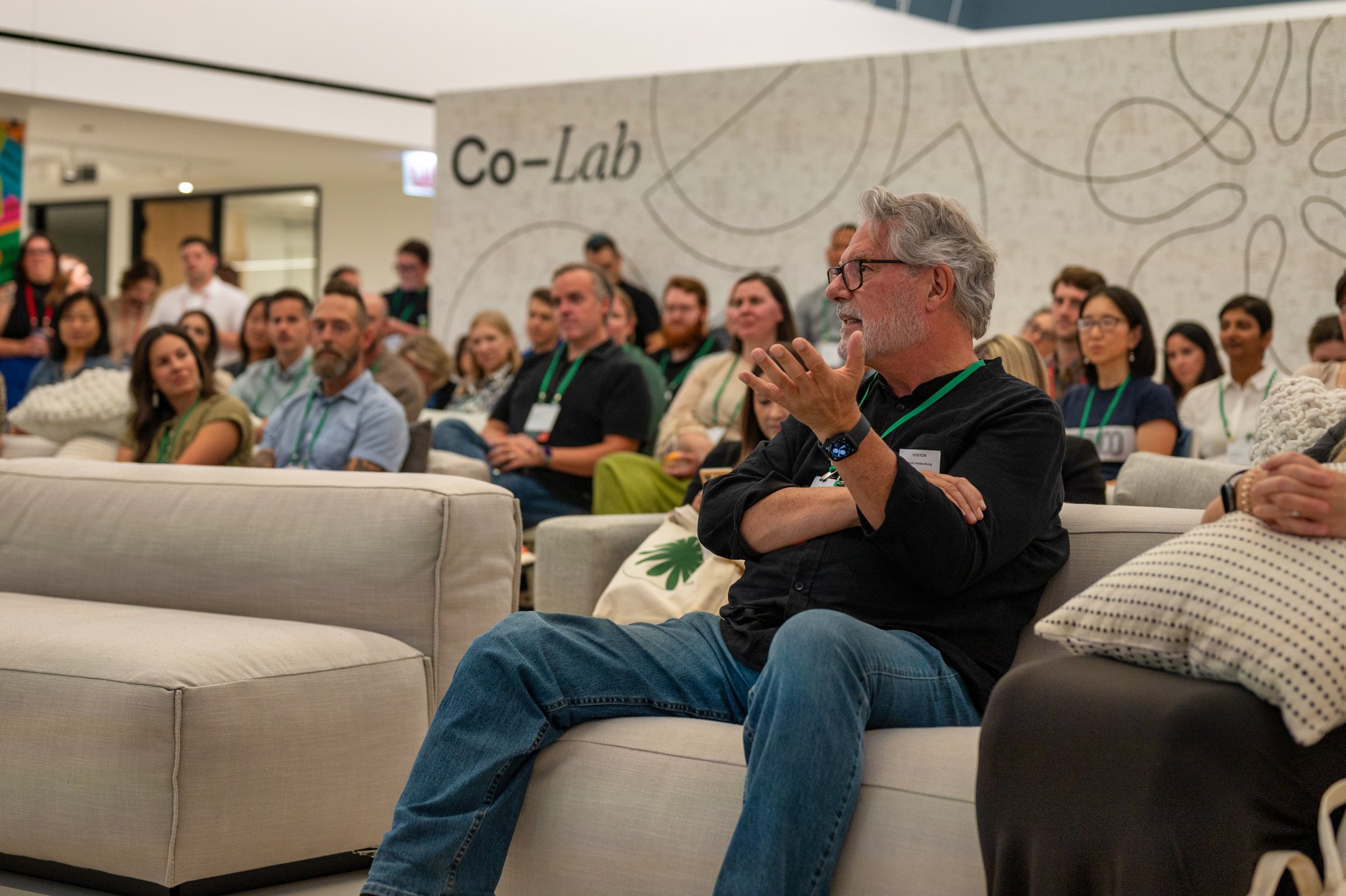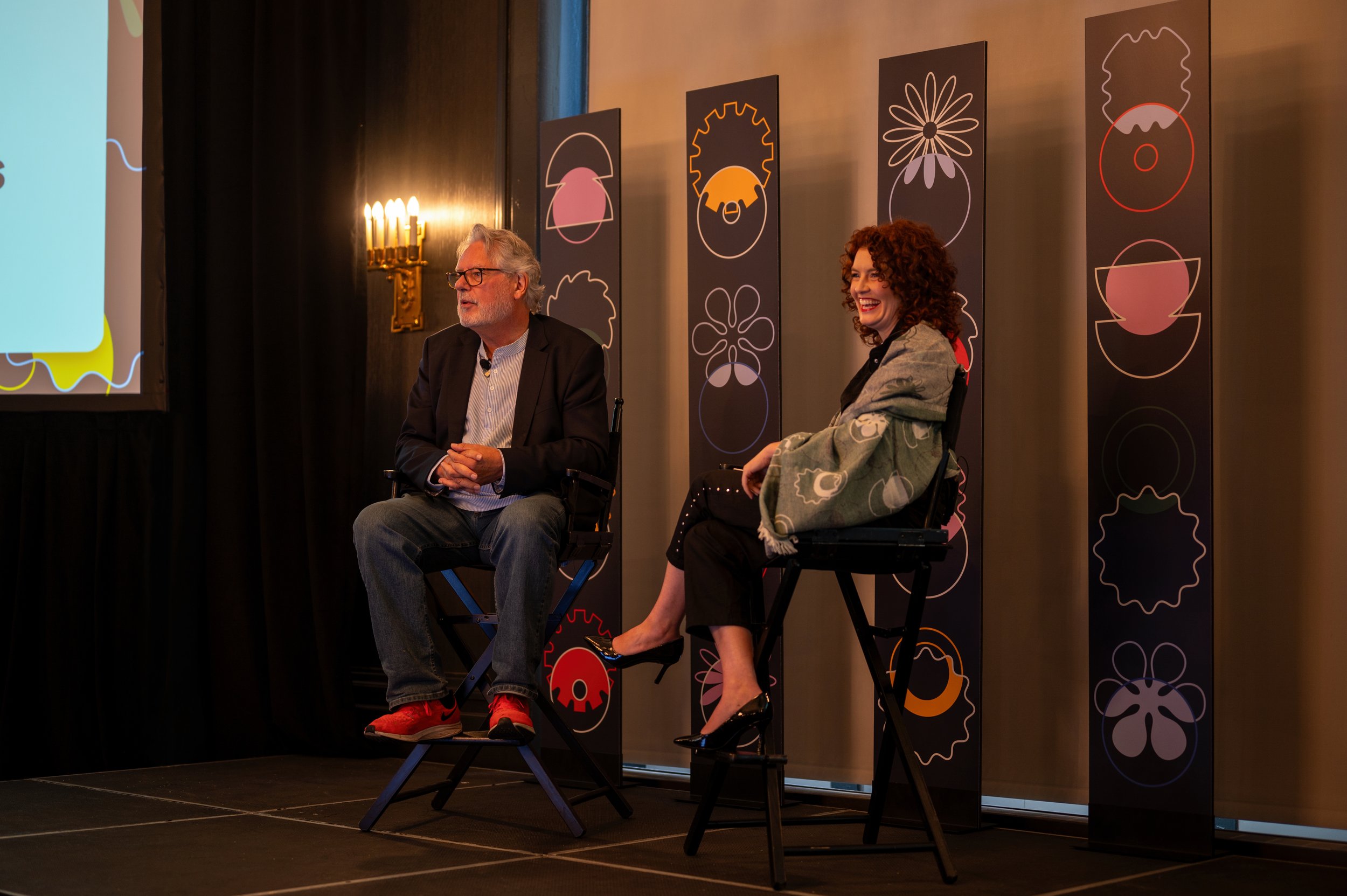Co-Lab: UXR Insights & Trends
I just got back from the Co-Lab Conference held in Chicago this week. It was my second year attending and speaking at the conference. And I honestly think that it’s the very best in the field because the attendees are practitioners who are doing the actual work and leaders who are truly driving innovation in research, design, and technology. It’s sponsored and put on by dscout, the research platform company. The conference is the brainchild of Michael Winneck, dscout’s CEO. I’ve been impressed by Michael from the time I met him as a professor at Northwestern University as we co-led a capstone project during my year working with design schools and universities. He's a creative thinker and a major force in the UX research field.
Organization
The organization of the conference was refreshingly different with only few insightful keynotes and mostly thought-provoking three to five eight-minute lightening talks in the main conference space followed by moderated table-group discussions in another space.
I was asked to do the final keynote summarizing and wrapping up the conference together with the amazing Katie Johnson. Like we did in that keynote, I’ll reflect on and share the key insights and trends that we heard as well as share my own perspectives on them as well.
Business focus
I had presented at last year’s conference my view that we as researchers should “open the aperture” to focus on the entire client experience, to “follow the money” to understand how our research could contribute optimally to the businesses we work for, and to be laser-focused on making sure that our research measurably adds value to the business. I was absolutely delighted to hear these themes during the conference so much so that they appear to now be going mainstream. I of course wasn’t the only one advocating for these changes early on but it was heartening nonetheless to see how central they were in this conference.
Julie Norvaisas kicked off the keynotes in a segment titled “Owning (Y)our Future”. She talked about focussing on yourself, your team, your organization, our discipline, and on humankind. She also encouraged attendees to own leadership possibilities, to be an emergent leader if you're not an official one and to be successful by focusing on doing what’s needed to make the organization successful. You don’t need permission. She argued against taking an “us vs them” mentality and victim attitude.
Judd Antin gave a captivating talk encouraging attendees to own their business’s success and in doing that stop focusing on what our discipline has been focussed on for the past 15 years including user-centered empathy, including user's voices in the design space, methodological rigor, etc. Those are necessary but they’re “inside baseball”, to use an American phrase. Our discipline experienced a reckoning, a change brought about by macro-level sifts, technological changes, and our own mistakes. The ideas from the past won't work for the next phase. We need to be driving successful businesses. A particularly salient part of his talk involved the showing of a visual that initially showed looking through a keyhole and seeing two people but when you open the door, we see a burning city. He advocated for getting out of the building, literally, to see the full picture. He also advised that researchers should use their research methods to understand their colleagues, especially in meetings, to determine who sits with whom, what their body language is, in order to know how to best integrate research work into the company. User and business goals need to be one and the same with everyone aligned.
I’ve used the phrase “the entire client experience” as the focus for my teams for years and I reiterated at this conference that I used to tell the researchers on my team to consider our organization inside IBM to be like a startup with funding from an investor, our SVP, and that we needed to show impact before I could ask for next year’s funding. I also told my staff that their purpose was to make the lives of our users more enjoyable and productive and simply completing a study barely did half the job. They needed to see the insights through to the implementation and delivery. For the Habits for a Better World project that I’m running right now with Carly Williams, we regularly remind our researchers to keep our nonprofit’s end objective in mind which is a documentary inspiring behavior change to make the world a better place. We also need to conduct responsible research, be conscious of how much the research costs, and what outcome for the business it will yield.
Sara Wachter-Boettcher talked about owning our power (even if it feels like we don't have any). She shared a case study of a person who worked all the time and felt powerless. And that person isn’t alone with 50% of design managers struggling mentally. Many are pessimistic about the state of the field. They believe that we're in turmoil and that businesses don't know if they want or need us. Sara took a refleshingly positive view that I’m completely aligned with that we can't afford to lead with fear. She shared the Karpman Drama Triangle with the villain, the hero, and the victim and made the case that our teams need us to break this cycle. We got into UX to do good but we’re over-rely on UX to affirm that we're good. Sara made the case that we are good and that we are powerful. And our teams need us to own that power. She also made the case that having strong identities outside work makes stronger leaders inside. As many know, I've done that my entire career with my keynoting, teaching, writing, and change making. It built my confidence and ego even if my day job didn’t.
redesigning our UXR Product
I also found it heartening to hear several presenters mentioning the need to consider our research deliverables as products that need to be designed, something I too have been a broken record on for some time. I told the story of watching playback recordings of research presentations when I took on the role of VP of Global UX Research at IBM. I had to sit through most of the presentation talking about methods, participants, etc. before I got to hearing the key findings and recommendations right at the end of the presentation. We researchers admonish teams that adopt a “build it and they will come” approach to product development but that’s exactly the approach we often take to our own work. I mentioned that we changed that at IBM by starting with the most important takeaways from the work and then optimizing and even technically facilitating getting recommendations directly into the product roadmap and into the product. A couple of visuals to keep in mind about focusing on what you did versus what you found out. We’re not in grade-school math class; you don’t have to show your work. And underwear is important but you don’t have to show it.
Several presenters made the point that researchers aren't asking good questions and that they’re not considering whether the learning objectives are understood and in alignment. What hypothesis/assumptions are already on the table? What decisions are we influencing? Turning our skills on our selves. Set the stage, gain a baseline understanding, and future-state ideation. We collect rich information but distill it into slides and expect the people watching them to have the same empathy as we observed. Translate insights to product outcomes together with our partners. They're bought in and understand the value of research better. Partners have to be more hands-on because it makes research accessible and inclusive.
generalist vs specialist
Another major theme was that of the generalist versus specialist. It was argued that we are the catalysts and that specialists should be moving to resourcefull generalists. The argument for this was the trends that human-centered culture is no longer owned by UX. Largely due to design thinking and powerful playbooks that will only get better. Generalists use these and with even newer new tools like GenAI, anyone will able to be do this work. And roles and duties will continue to consolidate. The argument is that UXers need to support and cultivate these resourceful generalist professionals through teaching, supporting, and reinforcing adaptation. This is an example of leaning in, understanding how an organization is working, and adapting to it. Another is broadening our view that the customer isn’t always king, they’re one of several stakeholders all of whom are important.
I thought that this was an interesting discussion and it made me reflect back to a keynote that I gave to a cross-discipline meeting at a university. When I talked about design thinking, one of the business faculty members asked me, “with everyone doing design thinking, do we still need designers and researchers?”. I answered emphatically “yes!”. Everyone thinking like a designer doesn’t mean they’re doing design and the same goes for research. I use the T-shaped person to explain this. I characterize design thinking as one of the key skills to acquire that is representative of the horizontal stroke of the T but you still need to have a long vertical stroke for your superpower or main discipline whether design or research. While I totally agree that it is designers and researchers who are the catalysts for change and should be doing the teaching and supporting, I don’t believe this at all minimizes the need for design and research specialists. I do encourage designers and researchers to widen the vertical stroke of their T to include business, engineering, etc. skills as well. I do believe that we need to democratize UX research skills across disciplines but also, very importantly, within UX reseachers themselves. The wide range of educational backgrounds of researchers leads to some professing to only be qual researchers and others quant. I believe that any researcher should have both sets of skills.
Gen Ai
We had some incredibly insightful presentations and discussions on building Generative AI technology itself, evaluating it, and where it may go in the future. We got a glimpse into how dscout is building GenAI into it’s tooling and how they’re using research foundationally in that process. Others made the point that we need to develop metrics for evaluating GenAI tools and it was suggested that we should move from the focus on the human to the equivalent measurement of the computer. And an example of building a healthcare GenAI app reinforced the importance of the framework I presented at the IxDC Conference in Beijing.
final thoughts
I can’t do justice to capturing everything important that was discussed in a two-day conference like this. I also decided to not call out each presenter and what they presented, other than the keynote presenters. If I had, it would have been a book and not a blog post. So if I failed to mention great work you shared at the conference or acknowledge your work, I do apologize.
The conference was a positive, uplifting, discipline affirming event. Attendees reinforced the value of the feeling that “we’re not alone”, that there are some great things happening to the discipline and the field that are becoming mainstream, and that the best way to navigate the future is together with our colleagues.
A huge thanks to Michael and the dscout team for putting on such an amazing conference and research platform, for inviting me, and thanks to the presenters, attendees, and most of all my keynote partner, Katie Johnson.




